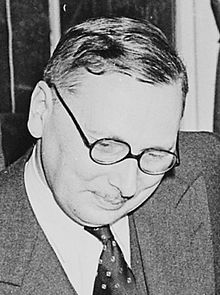René Pleven
| René Pleven | |
|---|---|
 |
|
| 88th Prime Minister of France | |
|
In office 12 July 1950 – 10 March 1951 |
|
| Preceded by | Henri Queuille |
| Succeeded by | Henri Queuille |
|
In office 11 August 1951 – 20 January 1952 |
|
| Preceded by | Henri Queuille |
| Succeeded by | Edgar Faure |
| Personal details | |
| Born |
15 April 1901 Rennes |
| Died | 13 January 1993 (aged 91) Paris |
| Political party | UDSR |
| Religion | Roman Catholic [1] |
René Pleven (French pronunciation: [ʁəne pləvɛ̃]; 15 April 1901 – 13 January 1993) was a notable French politician of the Fourth Republic. A member of the Free French, he helped found the Democratic and Socialist Union of the Resistance (UDSR), a political party that was meant to be a successor to the wartime Resistance movement. He served as prime minister several times in the early 1950s, where his most notable contribution was the introduction of the Pleven Plan, which called for a European Defense Community between France, Italy, West Germany, and the Benelux countries.
René Pleven was born in Rennes on 15 April 1901 as the son of a commissioned officer and director of studies at the Special Military School of St. Cyr. After studying law at the University of Paris, he failed the exam for the financial corps of the civil service, so he decided to move to the United States, Canada, and Great Britain to work there. He rose to the become a telephone company executive. In 1934, he married Anne Bompard.
Immediately after the breakout of the Second World War, he was in charge of encouraging the construction of aircraft for the Allies in the United States and of purchasing planes for France. As late as 1939, Pleven stated that "Politics do not interest me," but then a year later, he joined Charles de Gaulle's Free French Forces, which resisted the Nazi-allied French Vichy Regime. Pleven helped rally support for Free France in French Equatorial Africa. Returning to London, where de Gaulle and his forces were exiled, in 1941, he became national commissioner for the economy, finance, the colonies and foreign affairs of the French National Committee. In this role, he presided over a 1944 conference in Brazzaville, which opted for a more liberal policy towards the colonies and ultimately spurred the region's independence movements.
...
Wikipedia
